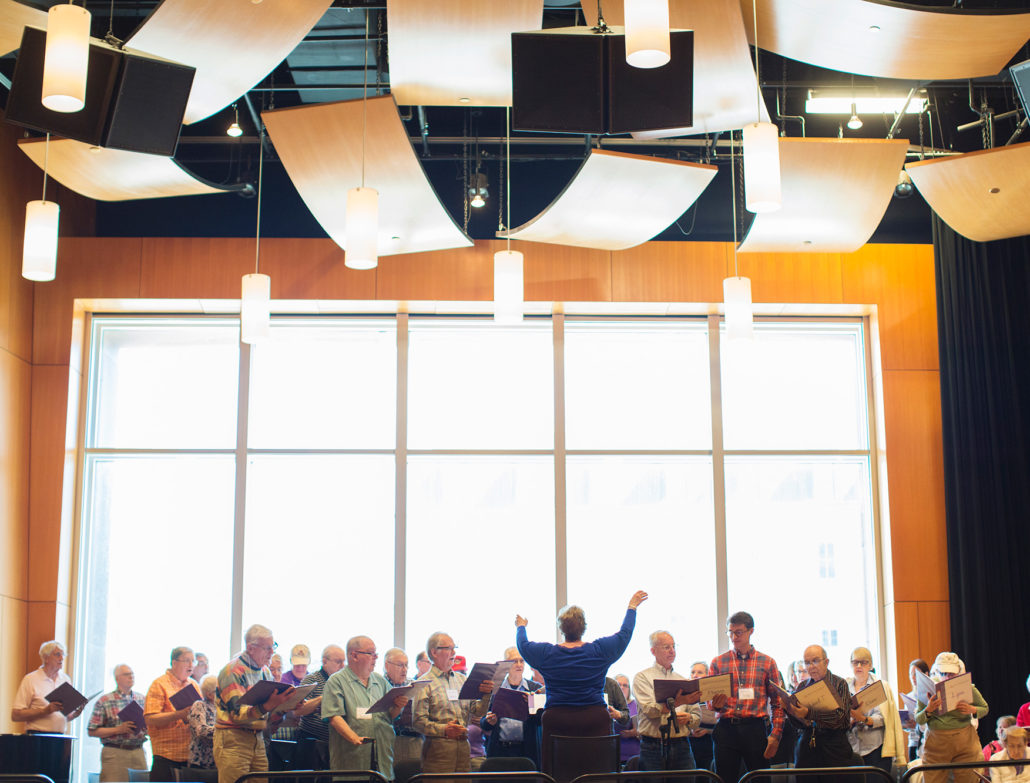Facilities
At GVI, we believe that using a high-quality facility for chorus rehearsals and performance sends a strong message—to singers, care partners, families, friends, and the community at large–that the chorus is valued and respected and should experience the same environment as other quality artists.

Rehearsal Space
Look for these features in a quality rehearsal space:
- Comfortable environment. The facility should have a good “feel” to it. Consider whether a space designed for music rehearsal and performance might be available, or maybe a church sanctuary or school auditorium. We have observed that many people with dementia and their care partners are somewhat reluctant to attend a rehearsal at a long-term or memory care facility.
- Transportation access. The rehearsal facility should have convenient access for the participants, including public transportation options. Make sure there is adequate safe parking, and if necessary, room for pick-up and drop-off near the door by cars, vans or shuttles.
- Facility size. The space should be an appropriate size for the number of participants. If the space is too big, the chorus loses its intimacy and choral members won’t feel secure in the setting.
- Good acoustics. Look for a school concert hall, church sanctuary, or other space where live unamplified music is frequently performed. In spaces like a school gymnasium, it will be very difficult for the singers to hear the director and each other because the sound will reverberate and become muddy. Spaces like a carpeted banquet room will be lifeless and make it difficult for the singers to blend their sound.
- Piano. A good quality in-tune piano is essential.
- Quality sound system. The music director will often need a microphone (preferably wireless) and a quality sound system so singers can easily hear directions during rehearsal.
- Lighting. Singers and the director will need good lighting to read their music.
- Interior access. The facility should be ADA-compliant for those participants with impaired mobility or wheelchairs. Have plenty of open space in the rehearsal area so singers using walkers, canes, or wheelchairs can easily navigate the area.
- Restrooms. Restrooms should be close to the rehearsal area, well marked, and easily accessible.
- Stage setup. Each singer will need a chair and sufficient room to walk and stand in front of the chair. If risers are used, be sure they are wide enough to accommodate the chairs and any mobility devices and have room for a person to walk across the riser while other singers are seated or standing.
- Social space. Space for social time before and after the rehearsal should include an area where snacks and beverages may be served. Some seating should be available.
- Climate control. Older singers and singers with dementia may be less able to adapt to spaces that have poor heating, cooling or lighting.
- Access to facility manager. A person who is very familiar with the facility should be on site and available during rehearsals.
- Music director. The music director will likely need a sturdy music stand and may want to conduct from a low platform or “podium.”
Performance Space
Ideally, the chorus will hold public performances at the rehearsal facility. Performing in a different venue requires the singers to become acquainted with the new place, both acoustically and logistically, and disrupts their transportation routine.
In any event, the performance venue should meet all the criteria for a quality rehearsal facility, and have these additional features:
- Adequate parking, seating, restrooms, and overall accessibility for audience and choral members
- Space for a ticket table
- Space for a post-concert reception
- Offstage preparation area (“green room”) that can be locked during the performance so singers’ personal belongings can be stored securely
